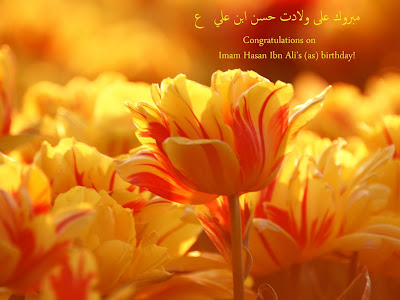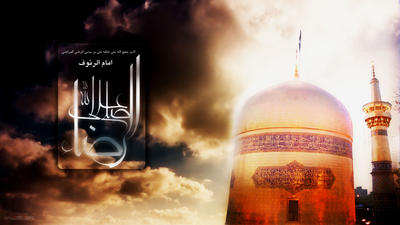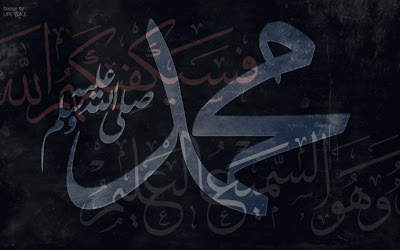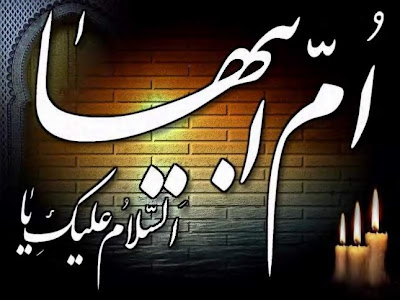Hadith No.1
The Heat of Husaini Love
Surely, there exists in the hearts of the Mu' mineen, with respect to the martyrdom of Husain (A.S.), a heat that never subsides.
Mustadrak al-Wasail, vol. 10, pg. 318
Hadith No.2
Imam Reza (A.S.) said:
The one for whom the day of A'shura is a day of tragedy, grief and weeping, Allah The Mighty, The Glorious, shall make the Day of Judgment, a day of joy and happiness for him.
Bihar al-Anwar, vol,: 44,pg: 284
Hadith No.3
Imam Reza (A.S.) said:
With the advent of the month of Muharram, my father Imam Kazim (A.S.) would never be seen laughing; gloom and sadness would overcome him for (the first) ten days of the month; and when the tenth day of the month would dawn, it would be a day of tragedy, grief and weeping for him.
Amaali Saduq, pg, 111
Hadith No.4
Laughing Eyes
The Holy Prophet (S.A.W.) said:
O' Fatimah! Every eye shall be weeping on the Day of Judgment except the eye which has shed tears over the tragedy of Husain (A.S.) for surely, that eye shall be laughing and shall be given the glad tidings of the bounties and comforts of Paradise.
Bihar al-Anwar, vol,: 44;pg,:293.
Hadith No. 5
Reward of the Martyred Companions
Imam Reza (A.S.) said (to one of his companions):
If you desire that for you be the reward equivalent to that of those martyred along with Husain (A.S.), then whenever you remember him say: 'Oh! Would that I had been with them! A great achievement would I have achieved'.
Wasaail al-Shia'h, vol.14, pg. 502
Hadith No. 6
The Customary Mourning
Abu Haroon al-Makfoof said:
I presented myself before Imam Sadiq (A.S.) whereupon he said to me: "Recite for me a poetry" and so I recited for him. He said "Not in this manner. Recite for me as you recite poems and elegies over the grave of Husain (A.S.)" and so I recited for him (again).
Bihar al-Anwar,Vol.:44, pg.: 287.
Hadith No.7
Reward for Reciting Poetry about Husain (A.S.)
Imam Sadiq (A.S.) said:
There is none who recites poetry about Husain (A.S.) and weeps and makes others weep by means of it, except that Allah makes Paradise incumbent upon him and forgives his sins.
Rijal al-Shaikh al-Tusi, pg.: 289.
Hadith No.8
People of Eulogies and Elegies
Imam Sadiq(A.S.)said:
All praise is for Allah, who has placed amongst the people, those who arrive in our presence, eulogizing us and reciting elegies about us.
Wasail al-Shia'h Vol.: 10, pg.: 469
Hadith No. 9
Poetry Recitation During the Period of Mourning
Imam Reza (A.S.) said (to De'bil, a poet sincereiy devoted to the Ahlul bayt):
I desire that you recite for me poetry, for surely, these days (of the month of Muharram) are the days of grief and sorrow, which have passed over us, Ahlul Bayt.
Mustadrak al-Wasail, vol. 10, pg. 386.
Hadith No. 10
Shi'ites- The Companions and Associates
Imam Ali (A.S.) said:
Surely, Allah has chosen for us followers (Shi'ites), who assist us and are happy at our happiness and are sad in our sadness.
Ghurar al-Hikam, Vol: 1/ pg.: 235.
Hadith No. 11
Paradise - The Recompense of A'zadari
Imam 'Ali Ibn al-Husain(A.S) used to say:
Every Mu'min, whose eyes shed tears upon the killing of Husain Ibn' Ali(A.S.) and his companions, such that the tears roll down his cheeks, Allah shall accommodate him in the elevated rooms of paradise.
Yannaabe' al-Mawaddah, pg.: 429.
Hadith No.12
Imam Sajjad(A.S.) said:
Surely, I have never brought to mind the martyrdom of the children of Fatimah (A.S.) except that I have been choked with tears due to it.
Bihar al-Anwar, Vol.: 46, Pg.: 109.
Hadith No. 13
Mourning in the Houses
For those unable to go for the ziarat of Imam Husain (A.S.) on the day of A'shura, Imam Baqir (A.S.) mentions the manner of performing A'zadari as follows: He should mourn over Husain (A.S.), weep for him and instruct the members of the house to weep for him. He should establish the mourning ceremony in the house by exhibiting lamentions and grief over him; the people should meet one another in their homes and offer condolences and consolations to each other over the calamities which befell him.
Kaamil al-Ziyaraat, Pg.: 175.
Hadith No. 14
Imam Baqir (A.S.) said:
Amirul Mu'mineen Ali(A.S.), along with two of his companions, happened to pass by Karbala and as he did so, tears filled his eyes. He said (to them), "This is the resting place of their animals; and this is where their luggage shall be laid down; and it is here that their blood shall be shed. Blessed are you O' Earth, that the blood of the beloved shall be spilled upon you."
Bihar al-Anwar, Vol.: 44, pg.: 258
Hadith No. 15
Tears - Barrier of Hell
Imam Baqir (A.S.) said:
He who remembers us, or in whose presence, we are remembered, and (as a result) tears flow from his eyes, even though they may be in the measure of a wing of a mosquito, Allah shall construct for him a house in paradise and make the tears a barrier between him and the fire (of hell).
Al-Ghadeer, Vol.: 2, pg.: 202
Hadith No. 16
Twenty Years of Weeping!
Imam Sadiq (A.S.) said:
As for A'li Ibn al-Husain (A.S.), he cried over Husain (A.S.) for twenty years (after the tragedy of Karbala); never would any food be placed before him except that he would begin to weep.
Bihar al-Anwar, Vol.: 46, Pg.: 108
Hadith No. 17
The Etiquette of Mourning
Imam Sadiq (A.S.) said:
When Ibrahim, the son of the Holy Prophet (S.A.W.) died, tears filled the eyes of the Holy Prophet (S.A.W.), whereupon he said, "The eyes are tearful and the heart is anguished (but) we shall not say anything which shall anger the Lord. Surely we, O' Ibrahim, are grief-stricken for you"
Bihar al-Anwar, Vol.: 22,Pg.: 157.
Hadith No. 18
Tearful Eyes
Imam Sadiq (A.S.) said:
He in whose presence we (and our miseries) are mentioned and, as a result, his eyes pour out tears, Allah shall make his face forbidden upon the fire of hell.
Bihar al-Anwar, Vol.: 44, Pg., 285.
Hadith No. 19
Husaini Gatherings
Imam Sadiq (A.S.) said to Fudhail:
Do you sit together, talk and discuss amongst yourselves?
Fudhail replied: Yes.
The Imam then said: I approve of these sittings. So keep our 'issue' (Imamate) alive. May Allah exhibit mercy on those who revive our issue and mission!
Wasail al-Shia'h, vol.:10, Pg.: 392
Hadith No. 20
Invaluable Tears
Imam Sadiq (A.S.) said (to Masma', one of those who mourned over Imam Husain (A.S.)):
May Allah have mercy upon your tears! Do know that you are regarded as being of those who are deeply concerned about us and of those who are happy at our happiness and aggrieved at our sorrow.
Do know that you shall witness the presence of my fathers near you at the time of your death.
Wasail al-Shia'h, Vol.: 10, Pg.:397
Hadith No. 21
Scalded Hearts
Imam Sadiq (A.S.) (while sitting on the prayer mat prayed for the mourners and those going for the ziarat of the Ahlul Bayt (A.S.) as follows):
O' Lord, have mercy upon those eyes, which have shed tears in compassion for us; and upon those hearts, which have been restless and blistered for us; and upon those wailings, which have been for us.
Bihar al-Anwar, Vol.:98, Pg.:8.
Hadith No. 22
Tears over the Oppressed State of the Shi'ites
Imam Sadiq (A.S.) said:
He whose eyes shed tears for our blood which has been shed, or for our rights which have been usurped, or for the humiliation meted out to us or to one of our Shiites, Allah shall accomodate him in paradise for a long time.
Amali al-Shaikh al-Mufid, Pg.: 175.
Hadith No. 23
Weeping of the Sky
Imam Sadiq (A.S.) said:
O' Zurarah! The sky had cried for forty days over (the martyrdom of) Husain (A.S.)
Mustadrak al-Wasail, vol. 1, pg. 391
Hadith No. 24
Prophet (S.A.W.) and Weeping over the Martyrs
Imam Sadiq (A.S.) said:
After the news of the martyrdom of Ja'far Ibn Abi Talib (A.S.) and Zaid Ibn Harithah reached the Holy Prophet (S.A.W.), whenever he he entered his house, he would weep profusely for them and say:'' They used to converse with me and were intimate with me and (now) both of them have departed together''.
Man La Yahdhuruhu al-Faqih, Vol.: 1, pg.: 177.
Hadith No. 25
Sympathy for Ahlubayt
Imam Sadiq (A.S.) said:
The breath of one who is aggrieved upon the injustice and oppression subjected to us, is tasbeeh (glorification of Allah), and his concealing our secrets, is jihad in the path of Allah.
The Imam (A.S.) them added: This tradition ought to be written in gold.
Amali al-Shaikh al-Mufid, pg.: 338.
Hadith No. 26
Mourning Angels
Imam Sadiq (A.S.) said:
Allah has appointed to the grave of Imam Husain (A.S.), four thousand anguished and grief-stricken angels, who weep over him (and shall continue to do so) up to the Day of Judgment.
Kamil al-Ziyaraat, pg.: 119.
Hadith No. 27
Weeping over Husain (A.S.)
Imam Reza (A.S.) said (to Reyyan Ibn Shabib):
O' Son of Shabib! If you have to cry over something, then do so over Husain Ibn 'Ali (A.S.) for surely, he was slaughtered in the manner in which a ram is slaughtered.
Bihar al-Anwar/ Vol.: 44/ pg.: 286.
Hadith No.28
Gatherings in Remembrance of the Imams
Imam Reza (A.S.) said:
He who sits in a gathering in which our affairs (and our path and aims) are discussed and revived; his heart shall not die on the day (Day of Judgment) when hearts shall die (of fear).
Bihar al-Anwar Vol.: 44, pg.:278
Hadith No. 29
Benefits of Weeping over Husain (A.S.)
Imam Reza (A.S.) said:
Those who weep should weep over the likes of Husain (A.S.) for surely, weeping over him does away with one's great sins.
Bihar al-Anwar, Vol.: 44/ pg.: 284.
Hadith No. 30
Forgiveness of Sins
Imam Reza (A.S.) said:
O' Son of Shabib! Should you weep for Husain (A.S.) in the measure that tears roll down your cheeks, Allah would forgive all the sins committed by you, whether they be the great sins or the small sins and whether they be meagre or immense.
Amaali al-Saduq, pg.:112.
Hadith No. 31
Intimacy with the Progeny
Imam Reza (A.S.) said (to Ibn Shabib):
O' Son of Shabib! If it makes you happy (and you desire) to be with us in the elevated ranks of paradise, then be sad in our grief and happy at our happiness.
Wasaail al-Shia'h, Vol. 14, pg. 502
Hadith No. 32
Day of Ashura
Imam Reza (A.S.) said:
One who refrains from seeking his (worldly) desires on the day of Ashura, Allah shall grant him his desires of this world and the hereafter.
Wasail al-Shia'h, vol. 14, pg.504.
Hadith No. 33
Pilgrim of Husain (A.S.)
Imam Sadiq (A.S.) said:
The zaair (pilgrim) of Imam Husain (A.S.) turns back (from his pilgrimage) such that not a single sin remains upon him.
Wasail al-shia'h, vol. 14, pg. 422.
Hadith No. 34
Husain (A.S.) Seeks Forgiveness for his Pilgrims
(Regarding someone who goes for pilgrimage to the shrine of Imam Husain (A.S.), Imam Sadiq (A.S.) said:
One who weeps for Imam Husain (A.S.), surely, the Imam (A.S.) observes him and seeks forgiveness for him and requests his holy fathers to (also) seek forgiveness for him.
Bihar al-Anwar vol. 44, pg. 281
Hadith No. 35
Intercession on the Day of Judgment
The Holy Prophet (S.A.W.) (said to Hadrat Fatimah (A.S.): On the Day of Judgment, you shall intercede for the ladies and I shall intercede for the men; every person who has wept over the tragedy of Husain (A.S.), we shall take him by the hand and lead him into Paradise.
Bihar al-Anwar vol. 44, pg. 292.
Hadith No.36
Imam Sadiq (A.S.) on Day of Ashura
A'bdullah Ibn Sinaan says:
I arrived in the presence of my master, Imam Sadiq (A.S.) on the day of Ashura and found him pale and grief-stricken, with tears streaming from his eyes like falling pearls.
Musadrak al-wasail, vol.6, pg. 279.
Hadith No.37
Neither Angels nor Prophets
The Holy Prophet (S.A.W.) said:
(On the Day of Judgment, a group would be seen in the most excellent and honorable of states. They would be asked if they were of the Angels or of the Prophets. In reply they would state): "We are neither Angels nor Prophets but of the indigent ones from the ummah of Muhammad (S.A.W.)". They would then be asked: "How then did you achieve this lofty and honorable status?" They would reply: "We did not perform very many good deeds nor did we pass all the days in a state of fasting or all the nights in a state of worship but yes, we used to offer our (daily) prayers (regularly) and whenever we used to hear the mention of Muhammad (S.A.W.), tears would roll down our cheeks".
Mustadrak al-Wasail, vol. 10, pg. 318.
Hadith No. 38
Visiting the Shrine of Imam Husain (A.S.)
Imam Sadiq (A.S.) said:
He (Imam Husain) sees those, who come to his shrine and he knows them by their names, their father's names and their ranks in the eyes of Allah, The Glorious, better than you know your own children!
Wasaail al-Shia'h, vol. 14, pg. 422.
Hadith No. 39
Isa (Jesus) (A.S.) weeps
Imam A'li (A.S.) said to Ibn A'bbas:
(Once when he happened to pass by Karbala), Isa Jesus (A.S.) sat down and began to weep. His disciples who were observing him, followed suit and began weeping too, but not comprehending the reason for this behavior, they asked him:"O' Spirit of God! What is it that makes you weep?" Isa Jesus (A.S.) said: "Do you know what land this is?" The disciples replied: "No." He then said: "This is the land on which the son of the Prophet Ahmad (S.A.W.) shall be killed.
Bihar al-Anwar vol. 44, pg. 252.
Hadith No. 40
All Creatures Weep over Imam Husain (A.S.)
Abu Baseer narrates that Imam Baqir (A.S.) said:
The humans, the jinn, the birds and the wild beasts (all) mourned and wept over (the tragedy which befell) Husain Ibn A'li (A.S.)
Kaamil al-Ziyaraat, Pg. 79.
˙·٠•●♥ اللَّهُمَّ صَلِّ عَلَى مُحَمَّدٍ وآلِ مُحَمَّدٍ وعَجِّلْ فَرَجَهُمْ ♥●•٠·˙









 4:07 PM
4:07 PM
 Mahdi Warrior
Mahdi Warrior



 Posted in:
Posted in: 


